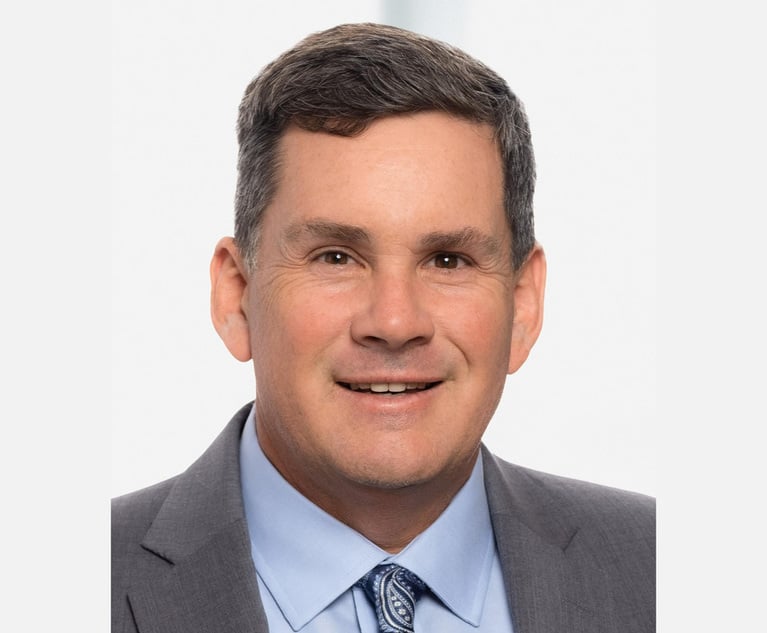Mining Social Media Since Myspace, Manhattan Prosecutor Moves to Private Sector
Christopher Ryan, former assistant DA and chief of violent criminal enterprises at the Manhattan DA Office, intends to continue his work on enterprise security and gun safety while at K2 Intelligence.
March 23, 2018 at 08:00 AM
5 minute read
The original version of this story was published on Legal Tech News
 Christopher Ryan, a former chief of violent criminal enterprises and former assistant DA at the Manhattan District Attorney's Office, who has now joined K2 Intelligence as its managing director.
Christopher Ryan, a former chief of violent criminal enterprises and former assistant DA at the Manhattan District Attorney's Office, who has now joined K2 Intelligence as its managing director. A shortage of investigative and security expertise is catching the eye of former government officials ready to move into the private sector. Add to the growing list Christopher Ryan, a former prosecutor at the Manhattan District Attorney's Office.
Ryan, who was assistant DA before becoming chief of violent criminal enterprises at the Manhattan DA Office, will join investigative firm K2 Intelligence as a managing director in its strategic risk and security practice after more than two decades serving as a public prosecutor.
Legaltech News caught up with Ryan to discuss his work as a prosecutor, including how he pioneered the use of social media evidence in gun-related cases, and how he intends to continue the work he did at the Manhattan DA while in the private sector.
LTN: Why did you choose to move to the private sector?
Christopher Ryan: In 20 years at the DA's office, I got to do just about everything that a prosecutor can do, including the trial, investigative and managerial aspects of the job. When I decided it was time to find a new challenge in the private sector, I was looking for a firm with the same ethical standards, and I have found that in K2 Intelligence.
What I've done over the last 20 years has been addressing problems that already happened; there is not a whole lot of preventive measures you take in the DA's office, as much as you try to prevent things. In the private sector, you have the ability to work with clients and hopefully try to prevent problems from arising in the first place.
What do you hope to accomplish at K2 Intelligence?
As a prosecutor, I had the opportunity to work with municipal corporations and private sector stakeholders across the country, particularly relating to the physical security of large public housing developments, which is a challenge in every city. I hope to further engage with state and local governments on these same issues of public safety.
Certainly, I'm also interested in continuing my work in the anti-gun violence sphere, which has been an important focus of my professional life for the past 20 years. There was a time not too long ago that gun violence was solely the concern of law enforcement. Obviously, that is no longer the case. Every private enterprise—including schools, malls, office buildings, industrial parks, hospitals, houses of worship, large multinational corporations and small businesses—is now vulnerable to the threat of gun violence from intruders or rouge insiders.
What's the biggest security threat you believe that enterprises today underestimate or ignore?
The biggest mistake being made today is not having a well-rehearsed business continuity and crisis plan which has been developed and tested by experienced security professionals.
How did you pioneer the use of social media evidence at the Manhattan DA Office?
When we first started mining social media, it was the Myspace era; we were really the first ones to start using this type of information. When we started, we weren't using anything that really wasn't readily available. We looked at different sites where people were posting evidence but we were doing it in a very sort of manual way. We weren't using any sort of technology to scour the internet.
With the advent of social media, we found that investigative targets, like everyone else, were regularly using social media to publicly chronicle their lives, often providing evidence of association amongst conspirators that otherwise would have required lengthy covert investigation. We also found that criminal targets regularly posted photos of themselves on social media with guns, drugs, cash and other contraband. We were very surprised that if you were a drug dealer, you would put photographs of yourself holding a gun and a big wad of cash on the internet.
But I think it's just a generational type of thing. When you have people in their 20s, they are just so attune to advertising the day-to-day aspect of their life on social media. And if you are a drug dealer, you tend to do the same thing.
What was the most interesting case you prosecuted at the Manhattan DA Office?
I'm most proud of our work in the area of firearms trafficking. In my years as chief of the violent crime unit, our cases took over 2,000 firearms off the streets of NYC and we indicted over 70 individuals on gun trafficking charges. In our minds, every gun is a homicide waiting to happen. We reached deep into Southern source states and prosecuted people who had never set foot in NYC, but who we knew were providing gun traffickers with firearms and ammunition that were bound for the streets of NYC.
On a personal note, the homicide of Leandra Ramos, which led to the passage of Leandra's Law, making driving drunk with a child in the car an automatic felony on the first offense. This is a case I will always remember.
This content has been archived. It is available through our partners, LexisNexis® and Bloomberg Law.
To view this content, please continue to their sites.
Not a Lexis Subscriber?
Subscribe Now
Not a Bloomberg Law Subscriber?
Subscribe Now
NOT FOR REPRINT
© 2025 ALM Global, LLC, All Rights Reserved. Request academic re-use from www.copyright.com. All other uses, submit a request to [email protected]. For more information visit Asset & Logo Licensing.
You Might Like
View All
Labaton’s Eric Belfi on Running Case Investigation, Analysis and Delaware Presence

Litigation Leaders: Quinn Emanuel's Michael Carlinsky on Training Associates to Think and Act Like Trial Lawyers

Innovation Award Individual Finalist: Charlie Hernandez, My Pocket Lawyer
1 minute read
Trending Stories
- 1In-House Lawyers Are Focused on Employment and Cybersecurity Disputes, But Looking Out for Conflict Over AI
- 2A Simple 'Trial Lawyer' Goes to the Supreme Court
- 3Clifford Chance Adds Skadden Rainmaker in London
- 4Latham, Kirkland and Paul Weiss Climb UK M&A Rankings
- 5Goodwin Hires Quinn Emanuel Partner to Launch Office in Brussels
Who Got The Work
J. Brugh Lower of Gibbons has entered an appearance for industrial equipment supplier Devco Corporation in a pending trademark infringement lawsuit. The suit, accusing the defendant of selling knock-off Graco products, was filed Dec. 18 in New Jersey District Court by Rivkin Radler on behalf of Graco Inc. and Graco Minnesota. The case, assigned to U.S. District Judge Zahid N. Quraishi, is 3:24-cv-11294, Graco Inc. et al v. Devco Corporation.
Who Got The Work
Rebecca Maller-Stein and Kent A. Yalowitz of Arnold & Porter Kaye Scholer have entered their appearances for Hanaco Venture Capital and its executives, Lior Prosor and David Frankel, in a pending securities lawsuit. The action, filed on Dec. 24 in New York Southern District Court by Zell, Aron & Co. on behalf of Goldeneye Advisors, accuses the defendants of negligently and fraudulently managing the plaintiff's $1 million investment. The case, assigned to U.S. District Judge Vernon S. Broderick, is 1:24-cv-09918, Goldeneye Advisors, LLC v. Hanaco Venture Capital, Ltd. et al.
Who Got The Work
Attorneys from A&O Shearman has stepped in as defense counsel for Toronto-Dominion Bank and other defendants in a pending securities class action. The suit, filed Dec. 11 in New York Southern District Court by Bleichmar Fonti & Auld, accuses the defendants of concealing the bank's 'pervasive' deficiencies in regards to its compliance with the Bank Secrecy Act and the quality of its anti-money laundering controls. The case, assigned to U.S. District Judge Arun Subramanian, is 1:24-cv-09445, Gonzalez v. The Toronto-Dominion Bank et al.
Who Got The Work
Crown Castle International, a Pennsylvania company providing shared communications infrastructure, has turned to Luke D. Wolf of Gordon Rees Scully Mansukhani to fend off a pending breach-of-contract lawsuit. The court action, filed Nov. 25 in Michigan Eastern District Court by Hooper Hathaway PC on behalf of The Town Residences LLC, accuses Crown Castle of failing to transfer approximately $30,000 in utility payments from T-Mobile in breach of a roof-top lease and assignment agreement. The case, assigned to U.S. District Judge Susan K. Declercq, is 2:24-cv-13131, The Town Residences LLC v. T-Mobile US, Inc. et al.
Who Got The Work
Wilfred P. Coronato and Daniel M. Schwartz of McCarter & English have stepped in as defense counsel to Electrolux Home Products Inc. in a pending product liability lawsuit. The court action, filed Nov. 26 in New York Eastern District Court by Poulos Lopiccolo PC and Nagel Rice LLP on behalf of David Stern, alleges that the defendant's refrigerators’ drawers and shelving repeatedly break and fall apart within months after purchase. The case, assigned to U.S. District Judge Joan M. Azrack, is 2:24-cv-08204, Stern v. Electrolux Home Products, Inc.
Featured Firms
Law Offices of Gary Martin Hays & Associates, P.C.
(470) 294-1674
Law Offices of Mark E. Salomone
(857) 444-6468
Smith & Hassler
(713) 739-1250






